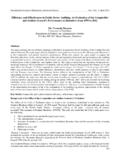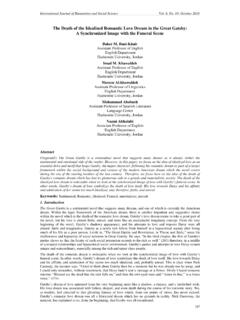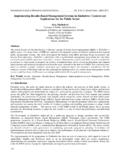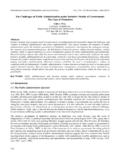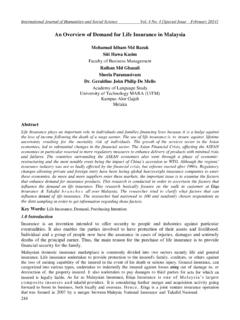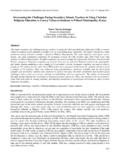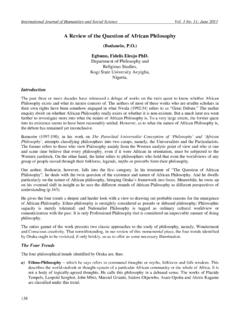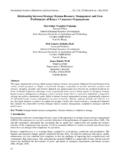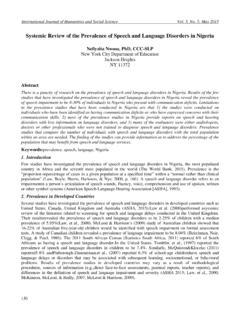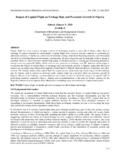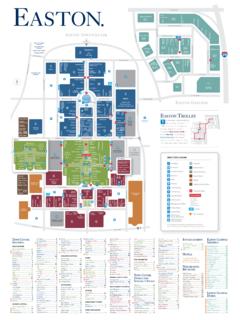Transcription of Understanding and Exploring Illness and Disease in South ...
1 International Journal of Humanities and Social Science Vol. 2 No. 24 [Special Issue December 2012]. Understanding and Exploring Illness and Disease in South Africa: A Medical Anthropology Context Bonginkosi Maxwell Nkosi Department of Development Studies & Anthropology University of Zululand South Africa Abstract Illness and Disease have crippled the world so dearly and sickness seems to govern the nests of the poor. As a result, medical anthropologists were keen to get a closer look at the relationship between human health and culture holistically. The basic proposition of holism in anthropology is that human behavior and human health arises out of complex interactions taking place within the cultural systems. This includes among other aspects, the health and wellness of human being in society. This paper provides an Understanding of Illness and Disease by Exploring ethno-medicine, medical ecology and bio-cultural as sub-fields of medical anthropology and further explore the cultural causes of Illness and Disease in South Africa and finally explore the Understanding of people within the KwaDlangezwa area in KwaZulu-Natal.
2 Key Words: human health, Illness and Disease , culture. Introduction Anthropology as a social science field views or provides a profound Understanding of humanity, human existence, viewing human kind holistically and human health. The basic proposition of holism in anthropology is that human behavior and human health arises out of complex interactions taking place within the cultural systems (Haviland, 2008:34). Within the cultural system, this includes among other aspects, the health and wellness of human being in society. Medical anthropologists saw a need to explore and unpack human health, and the health care systems in society as informed or influenced by cultural tradition, customs, morals, etc. Medical anthropology born out of this need and Understanding , deeply explores human health, Illness and Disease . The article explores the broadness of human health and an Understanding of Illness in South Africa by borrowing from medical anthropology perspective.
3 It will also engage while analysing the theoretical framework of medical anthropology since 1963, tracing its history and the emergence of traditional medicine and healing in South Africa and the health care system as a whole. The article will also explore the causes of Illness by providing literature based on an Understanding of Illness and Disease . The primary objective of this paper/article is to offer a vivid Understanding and clear exploration of Illness and Disease from a medical anthropology based perspective. Using the angle of medical anthropology, this objective would be met in comparison with traditions and literature linked to these causes. The secondary objective of the study is to explore the possibility of critically Understanding medical anthropology as a subfield of cultural anthropology and the cultural causes of Illness attached to it and how this could shape health policy in the international health sector.
4 2. Medical anthropology defined According to Scrimshaw, (2000), medical anthropology is an interdisciplinary field which studies "human health and Disease , health care systems, and bio-cultural adaptation". This definition is popular used by many authors who have had written or commented about medical anthropology before. The definition provided by Schrimshaw (2000), McElroy (1993) and many others focuses on three key aspects namely: Human health and diseases that affects humanity 84. The Special Issue on Current Trends in Social Science Centre for Promoting Ideas, USA Health care systems in society and Bio-cultural adaptation to various environments and ecology as a system. From its beginning, Foster and Anderson (1978:1) defined medical anthropology as the cross-cultural study of medical systems and the bioecological and sociocultural factors that influence the incidence of health and Disease now and throughout human history.
5 According to this Understanding , Ericson (200) states that medical anthropology provides a broad Understanding and interpretation of human beings-their behavior, their diseases and illnesses, their medical systems and the place of each of these in the encompassing sociocultural system. Subfields of Medical Anthropology examined It is crucial that this article examines the crucial subfields of medical anthropology and how they all define and explain Illness and how Illness comes about. This includes in and among other aspects the following subfields: Ethno-medicine Medical Ecology Bio-cultural medical anthropology Ethno-medicine According to Inhorn, (2010) ethnomedicineis a sub-field medical anthropology that deals with the study of traditional medicines: not only those that have relevant written sources ( Traditional Chinese Medicine, Ayurveda), but especially those, whose knowledge and practices have been orally transmitted over the centuries.
6 The term 'ethnomedicine' is frequently used to characterize the object of study in ethnographic research on indigenous, usually non-Western, forms of healing and classifications of Disease and Illness . Ethnomedicine is itself defined as 'ethnomedical' since the focus of enquiry is the elucidation of indigenous concepts of sickness and its treatment. Interesting enough is how this examination or ethnographic study of indigenous concepts of sickness and Disease emerge and how cultural aspects and aspirations have in this. According to McElroy (2002:4), ethnomedical perspective focuses on health beliefs and practices, cultural values and social roles. According to him, health ethnographies encompass beliefs, knowledge and values of specialists including the roles of healers, patients or clients; the implements, techniques and pharmacopoeias of specialists; legal and economic aspects of health practices and the symbolic interpretation and interpersonal experiences of Illness .
7 These experiences of Illness are defined based on cultural values and norms and perception on the cultural causes of Illness and treatment. In some societies, indigenous understandings of sickness and modes of treatment are used as means through which to elucidate broader cultural themes in ethnographic investigation of indigenous modes of healing and their relationship to underlying conceptualizations and causes of Illness and health as part of a particular worldview has continued to be one of the three major orientations historically identifiable in medical anthropology. Another focus or research domain by ethnomedicine is the study of traditional healers; investigation of the comparative efficacy of 'traditional' and 'biomedical' approaches to the treatment of mental Illness , or ethnopsychiatry. This has been a popular topic among both 'transcultural'. psychiatrists and medical anthropologists in the recent years.
8 When examining mental Illness , medical anthropologists/ethnomedicine views such Illness by Exploring the cultural connotations with its implications in the mentality attributes. However, psychologists might have a more clinical point of view to this matter, but might be informed also by the value system underpinning the societal modes of operation. Medical Ecology It is important to examine and explore the second part of medical anthropology (medical ecology) in the Understanding of Illness and Disease to humans. According to Dickson (2001) medical ecology is a branch of social science that investigates the effect of the environment on human health and Illness . Human health and Illness are as a result of the environmental degradation, effects and other negative aspects which affects the quality of air we breathe, water, food, and ultimately our own health an own well being. Environmental degradation often leads to the various states Illness and health well-being of individuals.
9 Townsend cited in Singer & Erickson (2011:191) mentions the ever growing problem of antibiotic and pesticides resistance as another infectious Disease that lends itself as an ecological challenge. At the same breath, Townsend, mentions the emergence of a new variant of influenza A HINI which drew the attention of Anthropologists to view the relationship between pigs and people under the conditions industrial hog farming. 85. International Journal of Humanities and Social Science Vol. 2 No. 24 [Special Issue December 2012]. Medical ecology does not separate its theory and analysis from the ecosystem and the concept of natural system. According to Townsend (2009), the concept of ecosystem functions and services helps us to describe and define the global processes that contribute to our well-being, helping to cleanse the air we breathe, the water we drink and the kind of food we eat . In fact, according to medical ecology, humans are the integral part of nature while at the same time in control of nature.
10 Most of the time, human beings are unaware of their connectedness to the rest of the world, ecosystems and the natural resources. Medical ecology links the natural processes, ecosystem with living on earth, from the point of view of being human and how this in return impact on society. Because of the complex damage of the ecosystem influenced by huge chemical companies and biological systems, human s health and Illness has been since being affected. In the analysis and Understanding grounded by medical ecology, Illness greatly escalates higher and higher taking another dimension. The air we breathe is contaminated to an extent that it is not easy to escape. Many diseases that are as a result of air including tubercholosis (TB), influenza and many other diseases are prominently mounting. According to McElroy (1996:3), medical ecology assumes that Illness or Disease categories are universal. Universal in a sense that Illness rates can be measured and compared through time across geographical global space.
